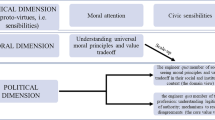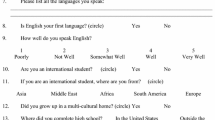Abstract
Ethical conduct is the hallmark of excellence in engineering and scientific research, design, and practice. While undergraduate and graduate programs in these areas routinely emphasize ethical conduct, few receive formal ethics training as part of their curricula. The first purpose of this research study was to assess the relative effectiveness of ethics education in enhancing individuals’ general knowledge of the responsible conduct of research practices and their level of moral reasoning. Secondly, we examined the effects of ethics education on the positive psychological outcomes of perspective-taking, moral efficacy, moral courage, and moral meaningfulness. To examine our research hypotheses, we utilized a pretest–posttest quasi-experimental design consisting of three ethics education groups (control, embedded modules, and stand-alone courses). Findings revealed that both embedded and stand alone courses were effective in enhancing participants’ perspective-taking, moral efficacy, and moral courage. Moral meaningfulness was marginally enhanced for the embedded module condition. Moral judgment and knowledge of responsible conduct of research practices were not influenced by either ethics education condition. Contrary to expectations, stand alone courses were not superior to embedded modules in influencing the positive psychological outcomes investigated. Implications of these findings for future research and practice are discussed.

Similar content being viewed by others
References
Antes, A. L., Murphy, S. T., Waples, E. P., Mumford, M. D., Brown, R. P., Connelly, S., et al. (2009). A meta-analysis of ethics instruction effectiveness in the sciences. Ethics and Behavior, 19(5), 379–402.
Bandura, A. (1997). Self-efficacy: The exercise of control. New York: Freeman.
Baumeister, R. F., & Vohs, K. D. (2002). The pursuit of meaningfulness in life. In C. R. Snyder & S. J. Lopez (Eds.), Handbook of positive psychology (pp. 608–618). Oxford: Oxford Press.
Bebeau, M. J., Pimple, K. D., Muskavitch, K. M. T., & Smith, D. H. (1995). Moral reasoning in scientific research: A tool for teaching and assessment. Bloomington, IN: Indiana University.
Bergman, R. (2004). Identity as motivation: Toward a theory of the moral self. In D. K. Lapsley & D. Narvaez (Eds.), Moral development, self and identity (pp. 21–46). Mahwah, NJ: Lawrence Erlbaum.
Blasi, A. (1999). Emotions and moral motivation. Journal for the Theory of Social Behaviour, 29(1), 1–20.
Bornstein, J., Drake, M. J., Kirkman, R., & Swan, J. L. (2010). The engineering and science issues test (ESIT): A discipline-sepcific approach to assessing moral judgment. Science and Engineering Ethics, 16, 387–407.
Choe, S. H. (2009, October 27). Disgraced cloning expert convicted in South Korea. New York Times. http://www.nytimes/2009/10/27/world/asia/27clone.html. Accessed July 28, 2010.
Conlon, E. (2008). The new engineer: Between employability and social responsibility. European Journal of Engineering Education, 33(2), 151–159.
Cook, G. (2005, June 9). Surveyed scientists admit misconduct: One third cite research tactics. Boston Globe.
Cook, T. D., Campbell, D. T., & Peracchio, L. (1990). Quasi-experimentation. In M. D. Dunnette & L. M. Hough (Eds.), Handbook of industrial and organizational psychology (pp. 491–576). Palo Alto, CA: Consulting Psychologists Press.
Davis, M. H. (1980). A multidimensional approach to individual differences in empathy. JSAS Catalog of Selected Documents in Psychology, 10, 85–104.
Harris, C. E. Jr., Davis, M., Pritchard, M. S., & Rabins, M. J. (1996, April). Engineering ethics: What? Why? How? And When? Journal of Engineering Education, 93–96.
Galloway, P. D. (2007, November). The 21st-century engineer: A proposal for engineering education reform. Civil Engineering, 46–51.
Gibbs, J., Clark, P., Joseph, J., Green, J., Goodrick, T., & Makowski, D. (1986). Relations between moral judgment, moral courage, and field independence. Child Development, 57(1), 185–193.
Haidt, J. (2001). The emotional dog and its rational tail: A social intutionist approach to moral judgment. Psychological Review, 108, 814–834.
Handelsman, M. M., Knapp, S., & Gottlieb, M. S. (2002). Positive ethics. In C. R. Snyder & S. J. Lopez (Eds.), Handbook of positive psychology (pp. 731–744). Oxford: Oxford Press.
Hannah, S. T., Avolio, B. J., & May, D. R. (2011a). Moral maturation and moral conation: A capacity approach to explaining moral thought and action. Academy of Management Review, 36(4), 663–685.
Hannah, S. T., Avolio, B. J., & Walumba, F. O. (2011b). Relationships between authentic leadership, moral courage, and ethical and pro-social behaviors. Business Ethics Quarterly, 21, 555–578.
Harris, C. E., Jr. (2008). The good engineer: Giving virtue its due in engineering ethics. Science and Engineering Ethics, 14(2), 153–164.
Haws, D. R. (2001). Ethics instruction in engineering education: A (mini) meta-analysis. Journal of Engineering Education, 90(2), 223–229.
Heitman, E., Olsen, C., Anestidou, L., & Bulger, R. (2007). New graduate students’ baseline knowledge of the responsible conduct of research. Academic Medicine, 82(9), 838–845.
Heitman, E., Salis, P. J., & Bulger, R. E. (2002). Teaching ethics in biomedical science: Effects on moral reasoning skills. In N. H. Stenack & M. D. Scheetz (Eds.), Investigating research integrity. Proceedings of the first ORI research conference on research integrity (pp. 195–202). http://www.ori.hhs.gov/documents/proceedings_rri.pdf. Accessed August 8, 2010.
Jonassen, D., Strobel, J., & Lee, C. B. (2006). Everyday problem solving in engineering: Lessons for engineering educators. Journal of Engineering Education, 95(2), 139–151.
Judge, T. A., & Bono, J. E. (2001). Relationship of core self-evaluations traits—self-esteem, generalized self-efficacy, locus of control, and emotional stability—with job satisfaction and job performance: A meta-analysis. Journal of Applied Psychology, 86, 80–92.
Kalliopuska, M. (1983). Relationship between moral judgment and empathy. Psychological Reports, 53, 575–578.
Kohlberg, L. (1969). Stage and sequence: The cognitive-developmental approach to socialization. In D. A. Goslin (Ed.), Handbook of socialization theory and research (pp. 347–480). Chicago: Rand McNally.
Kraiger, K., & Jung, K. M. (1996). Linking training objectives to evaluation criteria. In M. A. Quinones & A. Ehrenstein (Eds.), Training for a rapidly changing workplace: Application of psychological research (pp. 151–175). Washington, DC: American Psychological Association.
Lau, A. S., & Devon, R. (2001, June). Transformation: Ethics and design. In ASEE annual conference proceedings, Albuquerque, NM.
Leith, K. P., & Baumeister, R. F. (1998). Empathy, shame, guilt, and narratives of interpersonal conflicts: Guilt-prone people are better at perspective taking. Journal of Personality, 66, 1–37.
Lopez, S. J., O’Byrne, K. K., & Peterson, S. (2003). Profiling courage. In S. J. Lopez & C. R. Snyder (Eds.), Positive psychological assessment: A handbook of models and measures (pp. 185–197). Washington, DC: American Psychological Association.
Loviscky, G. E., Trevinio, L. K., & Jacobs, R. R. (2007). Assessing managers’ ethical decision-making: An objective measure of managerial judgment. Journal of Business Ethics, 73, 263–285.
Lucena, J., & Schneider, J. (2008). Engineers, development, and engineering education: From national to sustainable community development. European Journal of Engineering Education, 33(3), 247–257.
Maddux, J. E. (2002). Self-efficacy: The power of believing you can. In C. R. Snyder & S. J. Lopez (Eds.), Handbook of positive psychology (pp. 277–287). Oxford: Oxford Press.
May, D. R., Chan, A. Y. L., Hodges, T. D., & Avolio, B. J. (2003). Developing the moral component of authentic leadership. Organizational Dynamics, 32, 247–260.
May, D. R., Luth, M., & Schwoerer, C. E. (2009). The effects of business ethics education on moral efficacy, moral meaningfulness, and moral courage: A quasi-experimental study. In Academy of Management best paper proceedings, Chicago, IL.
May, D. R., Luth, M., & Schwoerer, C. E. (2010). The effects of moral efficacy, moral courage, and moral meaningfulness on moral behaviors at work. In Paper presented at the 2010 Academy of Management meeting in Montreal, Canada.
Mencl, J., & May, D. R. (2009). The effects of proximity and empathy on ethical decision-making: An exploratory investigation. Journal of Business Ethics, 85, 201–226.
Newberry, B. (2004). The dilemma of ethics in engineering education. Science and Engineering Ethics, 10, 343–351.
Parker, S. (1998). Enhancing role breadth self-efficacy: The roles of job enrichment and other organizational interventions. Journal of Applied Psychology, 83, 835–852.
Parker, S. K., & Axtell, C. M. (2001). Seeing another viewpoint: Antecedents and outcomes of employee perspective taking. Academy of Management Journal, 44, 1085–1100.
Paulhus, D. (1991). Measurement and control of response bias. Measures of Personality and Social Psychological Attitudes, 1, 17–59.
Plemmons, D. K., Brody, S. A., & Kalichman, M. W. (2006). Student perceptions of the effectiveness of education in the responsible conduct of research. Science and Engineering Ethics, 12(3), 571–582.
Powell, S. T., Allison, M. A., & Kalichman, M. W. (2007). Effectiveness of a responsible conduct of research course: A preliminary study. Science and Engineering Ethics, 13(2), 249–264.
Rest, J. R. (1976). New approaches in the assessment of moral judgment. In T. Lickona (Ed.), Moral development and behavior: Theory, research, and social issues. New York: Holt, Rinehart, & Winston.
Rest, J. R. (1986). The major components of morality. In W. M. Kurtines & J. L. Gerwitz (Eds.), Morality, moral behavior, and moral development (pp. 24–38). New York: Wiley.
Rest, J., Narvaez, D., Thoma, S., & Bebeau, M. (1999). DIT2: Devising and testing a revised instrument of moral judgment. Journal of Educational Psychology, 91(4), 644–659.
Roach, S., & Simon, J. (2008). Teaching and assessing graduate ethics in engineering, science, and technology. In M. Iskander (Ed.), Innovative techniques in instruction, technology, e-learning, e-assessment, and education (pp. 509–513). Netherlands: Springer.
Seligman, M. E. P. (2002). Positive psychology, positive prevention, and positive therapy. In C. R. Snyder & S. J. Lopez (Eds.), Handbook of positive psychology (pp. 3–9). Oxford: Oxford Press.
Sonenshein, S. (2007). The role of construction, intuition, and justification in responding to ethical issues at work: The sensemaking-intuition model. Academy of Management Review, 32, 1022–1040.
Thomsen, M. (2007). A course treating ethical issues in physics. Science and Engineering Ethics, 13(1), 117–127.
Treviño, L. K., Weaver, G. R., & Reynolds, S. J. (2006). Behavioral ethics in organizations: A review. Journal of Management, 32, 951–990.
Wade, N. (2010, August 20). Harvard finds scientist guilty of misconduct. New York Times. www.nytimes.com/2010/08/21/education/21harvard.html.
Weber, J., & McGivern, E. (2010). A new methodological approach for studying moral reasoning among managers in business settings. Journal of Business Ethics, 92, 149–166.
Acknowledgments
An earlier version of this manuscript was presented at the 2011 International Association for Business and Society (IABS) conference. This research project was funded by the National Science Foundation (NSF) over a 3-year period (NSF Grant #0629443). The authors would like to thank the faculty and students who participated in this project as well as acknowledge the on-going discussions about the project that we had with our colleagues Joshua Rosenbloom, Richard De George, Daniel Bernstein, and Saeed Fahroki.
Author information
Authors and Affiliations
Corresponding author
Rights and permissions
About this article
Cite this article
May, D.R., Luth, M.T. The Effectiveness of Ethics Education: A Quasi-Experimental Field Study. Sci Eng Ethics 19, 545–568 (2013). https://doi.org/10.1007/s11948-011-9349-0
Received:
Accepted:
Published:
Issue Date:
DOI: https://doi.org/10.1007/s11948-011-9349-0




